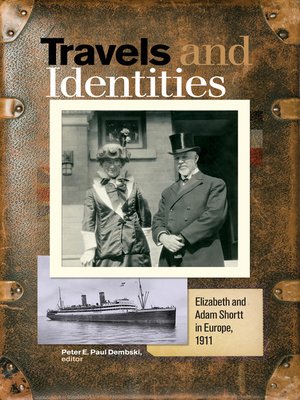Travels and Identities
ebook ∣ Elizabeth and Adam Shortt in Europe, 1911 · Life Writing
By Peter E. Paul Dembski

Sign up to save your library
With an OverDrive account, you can save your favorite libraries for at-a-glance information about availability. Find out more about OverDrive accounts.
Find this title in Libby, the library reading app by OverDrive.



Search for a digital library with this title
Title found at these libraries:
| Library Name | Distance |
|---|---|
| Loading... |
Elizabeth Smith Shortt was one of the first three women to obtain a medical degree in Canada, and her husband, Adam Shortt, enjoyed a successful career as a professor of politics and economics at Queen's University in Kingston. In 1908 Adam Shortt relocated his family to Ottawa to take up a commission to oversee civil service reform under Prime Minister Wilfrid Laurier. There he convinced his superiors that an onsite investigation of four European countries would expedite his effort to improve Canada's bureaucracy, and in June 1911 he and Elizabeth embarked on their trip. This book chronicles their Atlantic crossing and extended visit to England, as well as trips to Switzerland, Austria, Germany, and the Netherlands.
The Shortts were generally pleased with England and its values, but Elizabeth was sharply critical of the behaviour of British nurses. Her diaries and letters, here reprinted, critiqued the lands and peoples she visited in Europe. Leading foreign feminists such as Lady Chichester and Mrs. Maud of the Mothers' Union in England sought her advice, as did Alice Salomon in Germany, the corresponding secretary of the International Council of Women. The diaries and letters presented in this volume reveal the multifaceted nature of Adam and Elizabeth Shortt, from public figures to difficult employers to a couple who couldn't help but live beyond their means.
Peter E. Paul Dembski's introduction paints a picture of a couple who lived as moderate liberals with occasional conservative or radical views, and who blended science and an adherence to Protestant Christianity into their thinking. Their travel experiences, during a period of building political upheaval, provide a valuable snapshot of pre–First World War European society and culture.







